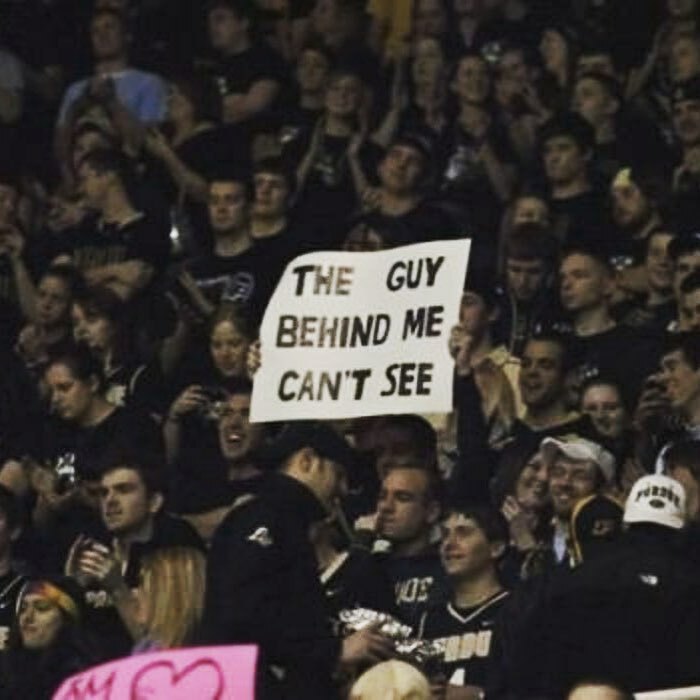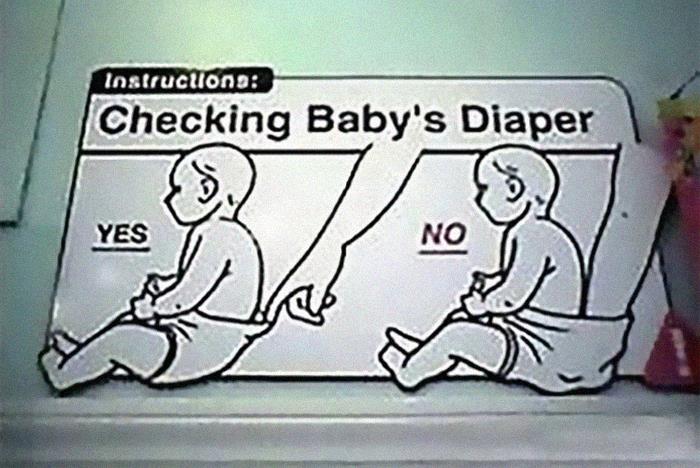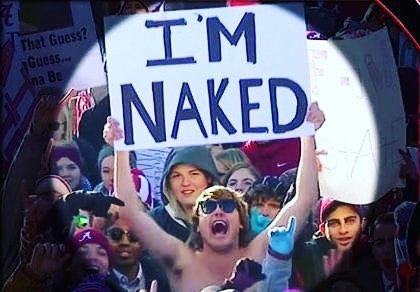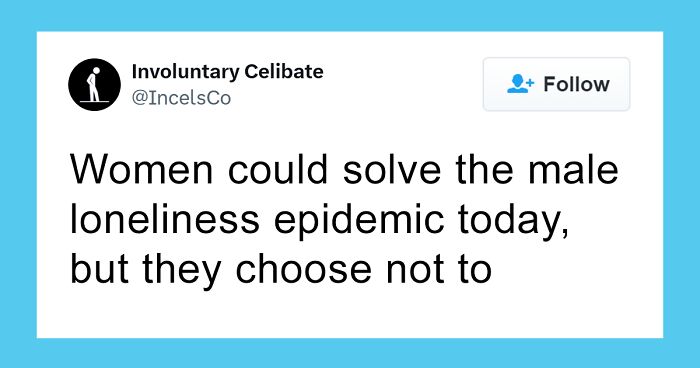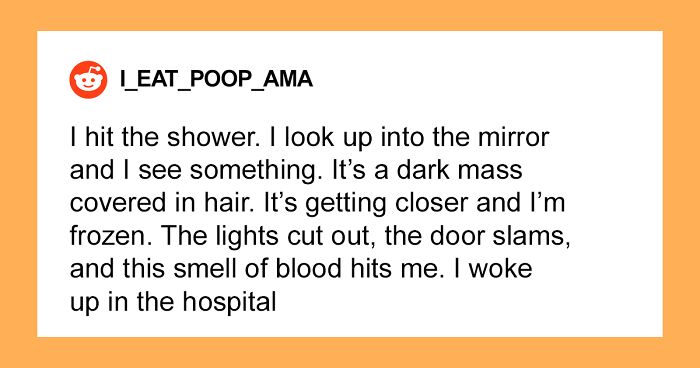
40 Of The Best Pics From This Instagram Account That Is Dedicated To The Most Random, Absurd Or Ridiculous Signs
If there's an Instagram account the legendary Dude With Sign is following, it's this one.
Fueled by pretty much the same vibes and a self-explanatory name, Absurd Signs shares pictures of people trying to send everyone the funniest and most ridiculous messages.
There's a bar owner who likes to think of whiskey as soup. A guy at a basketball game trying to distract his team's opponents from the game. It's a pretty colorful gang! I guess they're the real-life chaotic neutral fraction.
More info: Instagram
This post may include affiliate links.
Nathan A Heflick, Ph.D., is currently a senior lecturer in psychology at the University of Lincoln in the United Kingdom. To understand absurdity, he says, we must first know what's a schema.
"A schema refers to people's expectations," he wrote in Psychology Today. "So for instance, one's schema for a card deck is that hearts are red, and spades are black. If you were to play with a deck with the colors reversed, this would disrupt your schemas."
Cognitively, schemas are important because they enable us to process and use a ton of information in the world very quickly with minimal effort and fuss. "To put this in perspective, imagine going some place entirely new where you have no idea what to expect. The sheer effort exerted in trying to function without your usual schemas would be exhausting."
Science shows that we are motivated to maintain our existing schemas. For example, the meaning maintenance model by Steven Heine, Travis Proulx, and Kathleen Vohs, says that people's need for things to make sense (to be meaningful, and consistent with their schemas and expectations) is so strong that when it is disrupted, people act with increased efforts to restore their "meaning frameworks."
In one study Proulx and Heine exposed participants to a story written by Franz Kafka. The story starts out with a clear storyline (a doctor heading out to help with a child's tooth ache) and ends with a series of meaningless statements.
As Heflick pointed out, from the perspective of the meaning maintenance model, this should elicit an increased need to affirm and validate one's sources of meaning (one's schemas and expectations).
And in the study, this occurred through an increased ability to learn a new language. Specifically, participants were exposed to a list of digits and then were more likely to detect patterns in a made-up grammar system when they had just read the absurd, meaninglessness story by Kafka.
"Put differently, when people had their schema threatened by reading something that did not make sense, they responded with an increased capacity to learn," Heflick explained.
The psychologist said this research has several interesting implications. "For starters, schemas serve many useful functions. But, when schemas are broken, they increase learning. So, presumably, people need to overcome their natural tendency to protect their schemas to maximize their ability to learn."
In practical terms, this could suggest that when people isolate themselves from outside information to protect their schemas (such as only watching or reading things that verify their views), they hinder not only their ability to learn about other perspectives (through a lack of information) but also their ability to learn anything novel or different.
So when you think about it, the folks behind these signs are actually doing a public service. They're increasing everyone's desire and ability to learn. I know, it sounds like a stretch, but science says so!
Interestingly, Rebecca Schwarzlose, a cognitive neuroscientist researching brain and cognitive development at Washington University in Saint Louis, says missing the point is part of human nature.
"You perceive only a small fraction of the energy and information buzzing all around you," Schwarzlose wrote. "Much of that ... information goes unseen and unfelt because your body lacks the capacity to detect it. Whereas birds can see ultraviolet light, snakes can see infrared light, insects can see the polarization of light, mice can hear ultrasonic frequencies, and electric fishes can detect faint electric signals with their skin, you can do none of these things because your eyes, skin, and ears lack the cellular machinery that would allow you to detect them."
Schwarzlose said territory in our brain is much like Manhattan real estate. It's both finite and expensive.
"Brains evolve and develop to make the most of that modest terrain. Your brain maps are distorted to save energy and space. And these distortions, in turn, distort how you perceive your world," she said.
Consider your sense of sight for a second. You can see far more detail at your center of gaze, or where you are looking at any given moment, than out of the corner of your eye.
"Ideally, you would be able to see things equally well out of the corner of your eye as you do at your center of gaze. But you need more neurons, and more connections between those neurons, to represent fine details," Schwarzlose said.
"In order to see equally well in your visual periphery as you do at your center of gaze, the visual maps in your brain would have to be thirteen times larger. If this change sounds innocuous, think again. It would make your visual brain maps alone too large to fit inside your skull. And that would leave no room for the brain maps you rely upon to hear, feel, and move."
To avoid such outcomes, brain maps devote most of their estates to representing detailed information from "sweet spots" for perception, at the expense of basically everything else.
"Oddly enough, your ability to perceive crucially depends on all that you don't perceive. Thanks to our limited senses and distorted brain maps, you can experience and interact with your world... and do it all with a brain that's smaller than a breadbox."
No wonder sometimes we don't get it.
Well now I gotta see the rest of the scene to see if he's telling the truth
You don't, just look at the expression on the face of the girl behind him...
This is what happens when people say things like "dad bods are sexy", people run with it...
This post have originally 41 images but was shorted to 40 according to votes ?!?!? 😳🤣😳🤣
Angelar: don't worry about upvotes and downvotes. Everybody gets on vote on each item, and some choose to downvote thing randomly of just for the sake of it. Your upvote is still there, if you click the green arrow again it goes off and you will see the vote count drop. You can click it back on to green again too (so you can change your mind about up and down votes). But the voting system seems to operate a little like high school, and it can be weird but don't worry, it means nothing :)
Gee, thanks BP for shortening the list to 40 so I have to click to see just one additional picture
Again BP, pick a theme and stick with it. These are repeats and there is no coherent idea running the thread. It's stupid signs, fake signs, funny signs, crazy signs.
This post have originally 41 images but was shorted to 40 according to votes ?!?!? 😳🤣😳🤣
Angelar: don't worry about upvotes and downvotes. Everybody gets on vote on each item, and some choose to downvote thing randomly of just for the sake of it. Your upvote is still there, if you click the green arrow again it goes off and you will see the vote count drop. You can click it back on to green again too (so you can change your mind about up and down votes). But the voting system seems to operate a little like high school, and it can be weird but don't worry, it means nothing :)
Gee, thanks BP for shortening the list to 40 so I have to click to see just one additional picture
Again BP, pick a theme and stick with it. These are repeats and there is no coherent idea running the thread. It's stupid signs, fake signs, funny signs, crazy signs.

 Dark Mode
Dark Mode 

 No fees, cancel anytime
No fees, cancel anytime 














